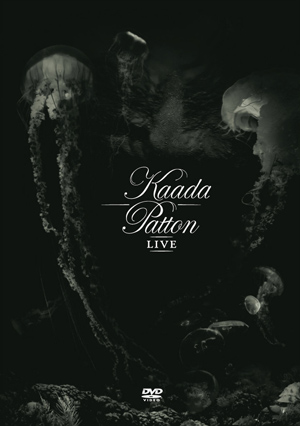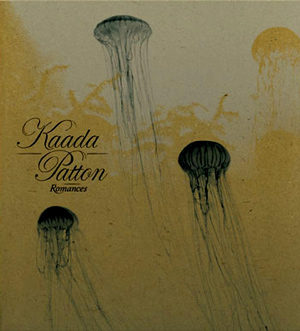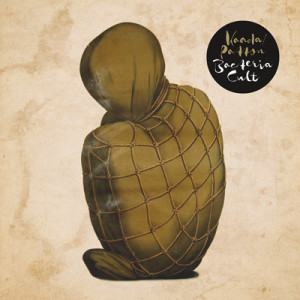“Working with John Kaada on this latest release was an honor and pure pleasure,” said Patton of resuming work Kaada. “His compositions have always resonated deeply with me and his orchestral arrangements for this project are harmonically dense and delicious! Each individual piece is so well constructed and inventively assembled that my vocal passages practically sang themselves. I’m hoping very much that we can seduce some eardrums and welcome listeners into this lush sonic ‘otherworld.’”
“We wanted to try new things,” explains Kaada. “Fully utilizing new technologies, combined with a large orchestra, while putting more attention towards melody and structure.”
The eight-song, orchestral collection exudes the music Ipecac has become well known for: eclectic, experimental and cinematic. Similar in feel to Fantômas’ Director’s Cut, as Kaada describes it, Bacteria Cult“dwells in the twilight zone where spooky and seductive meet.”
Bacteria Cult track list:
1. Red Rainbow
2. Black Albino
3. Peste Bubonica
4. Papillon
5. Dispossession
6. A Burnt Out Case
7. Imodium
8. Fountain Gasoline
CD/LP can be ordered from here : Ipecac Store
Glide Magazine
KAADA/PATTON RETURN WITH DARK, WONDROUS ‘BACTERIA CULT’
April 2, 2016 by James Roberts ♥♥♥♥♥♥♥♥♥♥
It’s been a busy year for Mike Patton. Between his reunion with Faith No More and his work with the Nevermen, we just can’t seem to go more than a few months before we get more Patton. Frankly, that’s never a bad thing. The singer has mastered the art of mysteriousness—and impressive feat, given his ubiquity these days—while also churning out masterpieces of experimental rock and roll. As diverse as his projects have always been, they’ve always managed to be monuments of composition, an act that belies his bizarre stage and public persona.
As interesting as Patton is as a front man and singer, he takes a bit of a second seat on his latest release, the reunion between him and Norwegian composer John Kaada. It’s been well over a decade since Kaada/Patton’s debut release, Romances, first wowed audiences, but the magic remains unfaded on their latest collaboration, Bacteria Cult.
Kaada has always been a bit of an enigma in the orchestral world. While the money, these days, is in scoring big budget feature length movies, Kaada has grown a cult following (one worthy of Patton himself) by remaining largely outside the realm of cinematic scores, save for a few small European films. Instead, he’s made his mark composing ethereal works of instrumental magic that transcend the conventional styles of modernity. Alternatively grounded and surreal, Kaada weaves a magical spell that hooks you from the deepest, darkest part of your brain.
This makes Kaada/Patton one of the more perfect collaborations in recent history. Both artists bring a knowledge of musical theory that serves to deepen the dreamy nature of the output. Here, Kaada plays Patton almost as an instrument, a single output of sound amidst a full orchestra.
Patton’s dreary intonations are weaved within the music becoming a part of the orchestra itself, as opposed to just a front man, adding a layer of complexity to an already complex arrangement.
Sonically, Bacteria Cult feels like the score to a movie that doesn’t exist but that I desperately want to see. The eight song collection flows through movements, suggesting an untold story of incredible interest and awesome scale. Close your eyes and you can almost picture the ephemeral scenery implied by the sound—sweeping landscapes of beautiful horror, a fantastic world grounded in reality. Hints of Masaru Sato and Ennio Morricone punctuate these feelings, as the music alternately suggests western tropes melded with eastern myth.
At all times, however, the music is pure Kaada. It’s a testament to his strength as a composer that Bacteria Cult can be so evocative of so much imagery. There’s a sort of darkness that is threaded throughout each of the album’s tracks—even the lighter, more playful tracks like “Papillon” and “A Burnt Out Case” are suggestive of a hidden danger amidst a wondrous scene, like a disguised demon tricking a young heroine to an impending doom with promises of magic and delight, the daggered teeth hidden behind a friendly smile.
Bacteria Cult is an instrumental delight for fans of complex orchestration. But the uninitiated need not be afraid to take the journey it calls you on. You don’t need to be a scholar of music theory to appreciate the world presented by this collaboration between mad geniuses. Its wonderful evocations are accessible to all without descending into pompous snobbery or complexity for complexity’s sake.
Kaada/Patton have produced another monument of modern orchestration that should dispel the notion that chamber music died with Bach. There are many worlds of wonder and magic to be found within the notes of Bacteria Cult, dark worlds of beauty and magic, where danger lurks for the unwary and every corner may hide the instrument of your demise. But that’s no reason not to take the trip. Just be sure to watch your step and never trust a friendly smile.
Official video – got an honorable “staff Pick” on vimeo in march 2017

KAADA/PATTON LIVE DVD
Released 3 Des. 2007
Shot nostalgically in black and white, the plenary 54-minute set encompasses Patton singing, playing electronics and filling percussion and Kaada providing backing vocals and keyboards. The band behind them function like a machine behind these two central foci. Like a Druid western opera score!
An additios to the live set are a 20 minute rehearsal film and behind the scenes photo gallery.
A performance clip of the song Pitié pour mes larmes, taken from THE KAADA/PATTON LIVE DVD, can be seen below.
(click to view)
Line-up / Musicians Live DVD
Concert Recorded Live in Denmark at Pavilion / The Roskilde Festival
BAND :
Erland Dahlen – Perc & Xylophone & vocals
Øyvind Storesund – bass & whistling
Geir Sundstøl – Guitar & Lapsteel & vocals
Børge Fjordheim – Drums & Vocals
Hallvard Wennersberg Hagen – Electronics
Mike Patton – Electronics & Vocals
John Erik Kaada – Keyboards & Vocals
—
- Directors: Marianne Bakke & Daniel Voldheim
- Director of Photography: Marianne Bakke & Daniel Voldheim
- Show Lighting Designer: Joakim Faxvåg
- Livesound: Kurt Schlegel
- Tour Manager: Tim Moss
- Mastering: Thomas Eberger at The Cutting Room
- Band Coordinator: Pernille Kaldestad
- Soundrecordings By : Burt Coop, Martin Rostbøll, Jan Sneum, Lizette Berg, Rasmus Winther, Jan & Jon Schumann
- Production Coordinator: Mads Sørensen
- Coordinator Roskilde Festival: Rikke Øxner og Anette Pihl
- Rehearsalspace Manager: Robert Mulder
- DVD Menus and Animations: Svein Kvamme
- Slideshow Pics: Siv Bugge Vatne
- Dialogue Text Translation: Reidar Ewing
- Colorcorrection & On-line: Ove-Kenneth Nilsen at Hocus Focus
- DVD packaging Design: Martin Kvamme
Thanks to Mads Sørensen, Danmarks Radio, Greg Werckman, Shaun MacDonald, Rai Sandow, Terry Bozzio , Fantefilm AS, Bulldozer Film AS, Thomas Søbstad, Pål Huuse, Roskilde Festival
SCENEPOINTBLANK

KAADA/PATTON – Romances
Released Nov. 30 – 2004
Mike Patton and fellow Ipecac resident Kaada’s collaboration Romances dwells in the twilight zone where spooky and seductive meet. Both artists’ work reveals a love of cinematic music: Kaada is an award-winning film music composer in his native Norway, and Patton has paid homage to great horror scores on Fantômas’ Director’s Cut. Romances is just as filmic than that album — actually, the affection for the spooky, evocative and arranged is the biggest romance going on here — but it is less noisy and intense, and more obviously melodic and playful, than Director’s Cut. “Invocation”‘s creepily whimsical melody and choral voices, for example, recall Danny Elfman’s work more than Fantômas’ grislier sound. Patton’s fondness for over-the-top theatricality tends to dominate Romances, particularly on the eight-minute “Aubade,” where his vocals span ghostly choral passages, Tasmanian devil-like grunts and growls and ululating that sounds like an unusually tuneful bleating goat. Like nearly all of Patton’s collaborations, the album makes the most of his voice, and he’s shown over and over again that he can adapt his singing to almost any setting (and vice versa). The torchy “Seule” and “Pitie Pour Mes Larmes” feature some of the most straightforward crooning he’s done in a while, but within the album’s context, lyrics like “You came to take my heart from me” have more to do with grand guignol than lingering glances and meaningful sighs, and the song’s richly layered harmonies once again emphasize the album’s mingling of sensual and eerie. Kaada’s part of the collaboration shows up in Romances’ lush, playful sound and eclectic influences: “L’Absent,” in another incarnation, could be a jaunty French folk melody, while “Viens, Les Gazons Sont Verts” mixes spaghetti western theme music with exotica. And, though it sounds pretty different than Thank You for Giving Me Your Valuable Time’s fusion of electronica and ’60s soul, “Pensees Des Morts” — a playfully eerie mutation of rattling percussion and an oddly buoyant melody — will appeal to fans of Kaada’s collage aesthetic. Eastern European music, cabaret, lounge and classic horror movie-music instruments like organs, theremin and harp all get their due and go a long way towards Romances’ journey from sentimental to creepy and back again. The album is immensely entertaining, not just for Patton and Kaada fans, but for anyone looking for a soundtrack to their own romantically macabre thoughts. (from ALL MUSIC by Heather Phares)
ADEQUACY
AVERSION
Billboard
Canadian
CMJ
Good Evil
site credits
• Album cover design by : Martin Kvamme
• Animal Mask Stills & Films : Alexandru Ponoran
• Concert background super-8 film edited by Svein Kvamme
• Underwater images by Pål Laukli
http://www.kaada.no
http://www.ipecac.com


